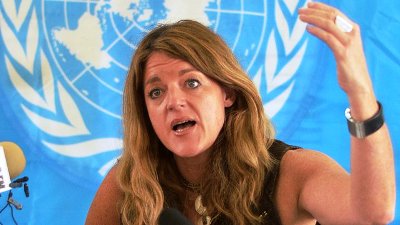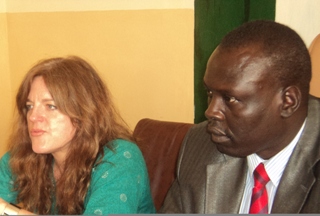Tackle key children’s issues in South Sudan, UNICEF boss urges
By Julius N. Uma and Bonifacio Taban Kuich
March 27, 2011 (JUBA / BENTIU) – Hilde Johnson, United Nations Children Fund’s (UNICEF) deputy executive director has appealed on Sunday to the southern government to fully commit itself in tacking key issues affecting children in the semi-autonomous region.

“I am encouraged with the progress made for children who are the future of Southern Sudan”, Johnson said.
“The transitional period for Southern Sudan provides a unique opportunity to put children at the centre of policy and decision making and to build on the gains made”.
As well as visiting children programmes in Unity state, the UNICEF deputy executive director also held talks with South Sudan’s president, Salva Kiir and other senior government officials.
During the meeting, Johnson reportedly urged the president to prioritize children’s issues such as birth registration and immunization. She further appealed for increased investment in social services.
Southern Sudan is recovering from decades of war that has devastated infrastructure, leaving thousands of children without access to schools, basic health care, and clean water. According to UNICEF statistics, one out of every seven children dies before his or her fifth birthday. Only about 10 percent of children, it says, are fully vaccinated, and less than 50 percent of all children receive five years of primary education.
“We need to confront the current glaring realities of deprivation. Now is the time to act to deliver on our commitments for the children of Southern Sudan. The key for their future lies with us,” Johnson said.
A former Norwegian minister for International Development, Johnson reportedly played a pivotal and instrumental role in the negotiations that led to the signing of the 2005 Comprehensive Peace Agreement (CPA), which ended over two decades of civil war between north and south.
Since the peace deal significant progress has been made notably in the provision of basic social services, including an integrated management of childhood illness, increase in school enrolment, and the development of legislation that protects the rights of children. However, the UNICEF representative says that more still needs to be done.
“To enable the progress being made for children to accelerate, the UN and its partners, the international community and the South Sudan government must invest in the necessary systems, structures and human resources”, the UNICEF deputy executive director said.
On her visit to Unity state on Saturday Johnson discussed the challenges faced by the state government on child welfare and water conservation.

Johnson said it was important to showing that there is change for the children of Unity state, so they can feel the different when South Sudan becomes independent and that the region is improving.
“We need to provide them with health facilities , better education and with water and so UNICEF is doing in number of states and other counties, but we still need to do more.”
The senior UN representative said she talked with the deputy governor of Unity state about the government needing to do more for children. Johnson urged the state’s citizens to take responsibility for children care, particularly to eradicate diseases like polio through vaccinations.
The latest polio vaccinations in South Sudan will take place from March 29 until April 1. One of the main goals of UNICEF is to protect children from polio through immunization campaigns.
Deputy Governor William Dawut Riak briefed the team of UN agencies, which was led by the Johnson on the challenges faced by southern Sudanese who have returned to Unity state from the north ahead of the region’s independence
Riak added that there were many obstacles faced by returnees in term of poor health and low education systems in the area. He called on UNICEF to build partnership with the state government in helping to improve good system of education in South Sudan.
Johnson is the author of, “Waging Peace in Sudan”, a book which describes this 2003 – 2005 peace process from a unique and insider perspective. Koffi Anan, former UN Secretary General who wrote the book’s forward, describes Johnson as a key figure who helped in bringing the protagonists together prior to the CPA signing in Naivasha, Kenya on 9 January 2005.
South Sudan will become independent 9 July 2011, after a referendum agreed as part of the 2005 deal, saw an overwhelming vote in favour of separation.
(ST)
